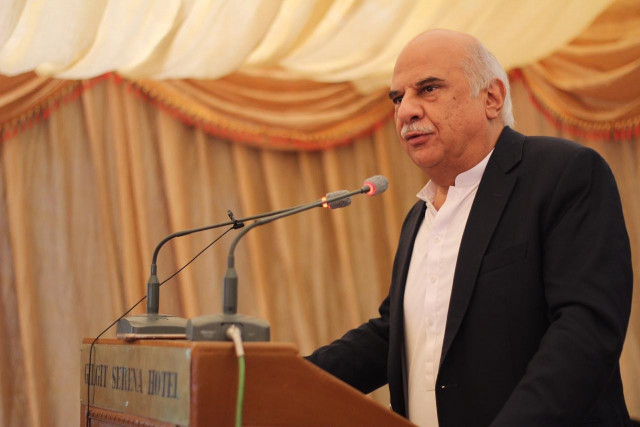Planning Commission deputy chief quits
PM accepts resignation; planning minister will now get more powers

Prime Minister Shehbaz Sharif has accepted the resignation of Planning Commission Deputy Chairman Jahanzeb Khan, further strengthening the position of his minister Ahsan Iqbal.
Khan had been reappointed as the Planning Commission deputy chairman by the previous government after reaching superannuation in August 2020.
The portfolio of deputy chairman will now be kept by Planning Minister Iqbal. He has earlier twice remained as the deputy chairman of Planning Commission.
Iqbal confirmed to The Express Tribune that Khan had resigned and he would also take over the responsibilities of the Planning Commission. Prime minister is the chairman of the commission.
The minister had expressed the desire to also take the portfolio of Planning Commission deputy chairman. All powers for approval of the country’s macroeconomic framework and the development projects rest with the deputy chairman, which renders the planning ministry’s portfolio less important.
The deputy chairman’s powers would further consolidate the position of Iqbal, who has already decided to wind up the China-Pakistan Economic Corridor (CPEC) Authority.
An attempt had been made to appoint Chaudhry Salik Hussain as the chairman of CPEC Authority and the CPEC minister but the move was subsequently thwarted.
Hussain – son of veteran politician Chaudhry Shujaat Hussain – has been appointed the federal minister for the Board of Investment.
Ahsan Iqbal said that the decision to close the CPEC Authority had already been taken and a formal summary would be sent to the federal cabinet next week for approval.
The decision to wind up the CPEC Authority was in line with the Pakistan Muslim League-Nawaz’s old policy, which was never in favour of establishing a parallel setup.
Even the Pakistan Tehreek-e-Insaf (PTI) government took over two years to set up the authority but it largely remained dormant as the last political administration was also not in favour of having another bureaucratic structure.
The PTI government had reluctantly enacted the CPEC Authority Act in May 2021 but it never filled the chairman’s position after former chairman Asim Saleem Bajwa resigned.
There is also a need to strengthen the Planning Commission, which over the years, has been made a subservient body to the all-powerful Pakistan Administrative Service (PAS) Group. Grade-21 officers of the Economist Group are forced to report to a grade-21 officer of the PAS Group serving in the commission.
Many positions in the Economist Group or in the administration of the Planning Commission have been handed over to the PAS or the non-Economist Group officers over the past few years. This has severely undermined the Economist Group.
A lone grade-22 seat of the Economist Group has not been given to it and no Economist Group officer has been promoted to grade-22 in the past few years.
The criteria for the promotion to grade-22 – the highest pay scale – for the Economist Group officers are different from the PAS Group officers.
The post of chief economist has also become vacant after Dr Zubair Ahmad resigned last week due to his remarks against the country’s important constitutional position holders, said the sources.
Ahmad had decided to resign much before making such remarks but he was stopped from quitting by the outgoing deputy chairman of Planning Commission.
The government on Friday posted Syed Zafar Ali Shah, a PAS officer, as the new planning secretary after his promotion to grade-22.
Imdadullah Bosal has been posted as the special finance secretary after his promotion. Earlier, the coalition government had decided to appoint Bosal as the chief secretary of Punjab but the idea was dropped.
Bosal has earlier served in the province and is known for his administrative skills.
The Planning Commission faces an immediate task to prepare the country’s five-year plan, as there has been no such guiding document since 2018. The PTI government failed to give either a five-year plan or a three-year economic growth strategy during its almost four-year tenure.
Published in The Express Tribune, May 22nd, 2022.
Like Business on Facebook, follow @TribuneBiz on Twitter to stay informed and join in the conversation.



















COMMENTS
Comments are moderated and generally will be posted if they are on-topic and not abusive.
For more information, please see our Comments FAQ